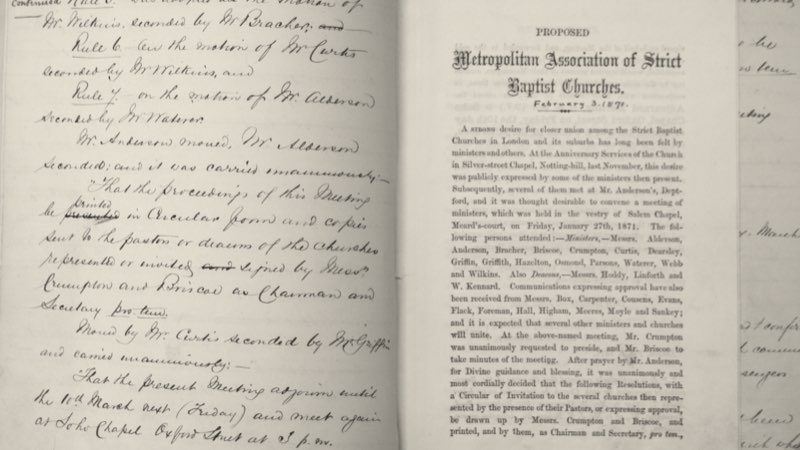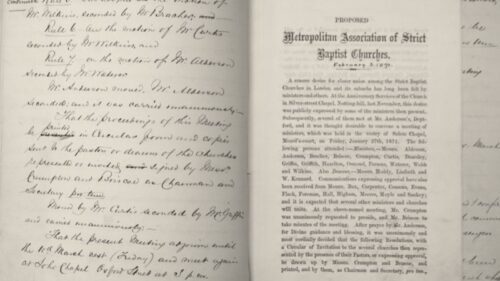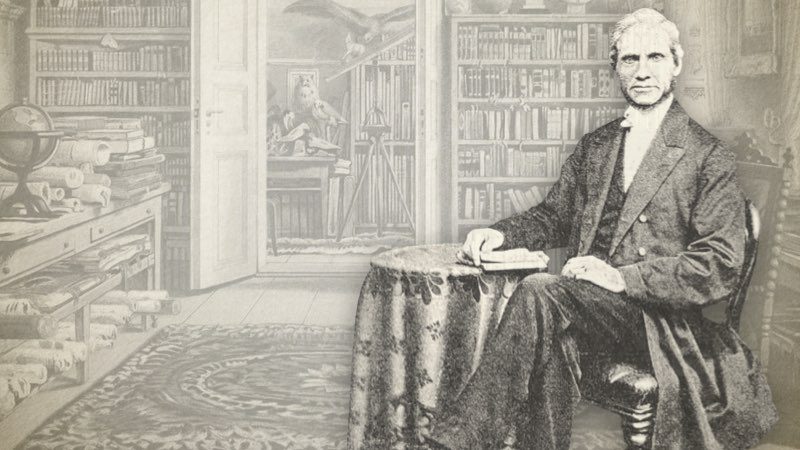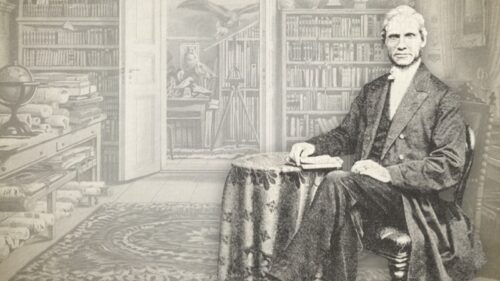-
The Formation Of The Metropolitan Association Of Strict Baptist Churches
The formation of the Metropolitan Association of Strict Baptist Churches is inseparably linked with the church meeting at Silver Street Chapel, Notting Hill Gate, and her pastor, David Crumpton. The Association, church and pastor subscribed to a restricted communion table and the tenets of Hyper-Calvinism. These are the leading features which set apart the Strict Baptist denomination from other churches, unions, societies and associations. On 4 April 1866, a Strict and Particular Baptist Church was organized in Stormont House, Queen’s Road, Bayswater, London. Several of the founding members seceded from the Strict Baptist church, meeting on Johnson Street, Notting Hill Gate. On the day of the new church’s formation, David Crumpton was appointed the pastor. Within two years, the church acquired a building—the Silver Street…
-
35 Bible Doctrine – The Significance Of JOHN GILL And His Writings
I would like to welcome you back to another study in Bible Doctrine. In our previous six studies, I have given a historic and theological overview of 17th and 18th century Hyper-Calvinism. I began with a definition—Hyper-Calvinism is any teaching which goes beyond that of Calvin himself. Accordingly, Hyper-Calvinism emerged in two waves. The first began with the publication of Calvin’s Institutes in 1536, culminating in the 1689 Second London Baptist Confession of Faith. This may be regarded as 17th century Hyper-Calvinism. The second began with the publication of two sermons preached by Benjamin Keach in the year 1692, culminating in John Gill’s Body of Divinity in the year 1770. This may be regarded as 18th century Hyper-Calvinism. Both groups were driven by a covenant…
-
1 The Existence Of God
Psalm 14:1.—“The fool hath said in his heart There is no God. They are corrupt, they have done abominable works, there is none that doeth good.” This Psalm is a description of the deplorable corruption by nature of every son of Adam, since the withering of that common root. Some restrain it to the Gentiles, as a wilderness full of briers and thorns, as not concerning the Jews, the garden of God, planted by his grace, and watered by the dew of heaven. But the apostle, the best interpreter, rectifies this in extending it by name to Jews, as well as Gentiles, (Rom. 6:9.) “We have before proved both Jews and Gentiles, that they are all under sin,” and (ver. 10–12) cites part of this…
-
The Life And Ministry Of James Wells
When Dr. Hamilton handed to the printer in his study the last sheet of his "Life of Ely," he said, "And let me beg of you to be quick about it, sir, for ministers are soon forgotten!" This remark is painfully true in many cases, not only of ministers, but of persons in general. However, the remembrance we have of certain champions of truth whose souls have long been with God abides in freshness to-day. “All pensive memories as we journey on, Longings for vanished smiles, and voices gone." Foremost in the galaxy of good and great men whose names we cherish, is the late Mr. James Wells, Pastor of the Surrey Tabernacle. Decision Of Character Marked The Life Of James Wells James Wells was…
-
Tom Nettles Versus George Ella On Fuller
Having been of quite another opinion than The Founders Journal so often about what I believe and disbelieve and having met their ill-founded and quite misleading arguments to a large extent in various articles and books, I was surprised to read an online article today (20.10. 2014) by Tom Nettles, originally published in Issue 53 of the Founders Journal for 2003 and entitled ‘Jonathan Edwards: An Appreciation’, containing a doubly mistaken report appertaining both to myself and Andrew Fuller. I had obviously missed this at the time it was written. In Nettles’ article, the author creates an effigy of wax to stick pins into which he gives my name in order to create an Andrew Fuller after his own heart. Bad as I believe Fuller’s…
-
Ten Arguments Against Duty Faith
It is popular in modern evangelical circles to preach that it is the duty of all men to believe in Jesus Christ as their Saviour. This teaching spawns numerous errors and is so widespread that to question it results in faithful men having their characters and ministry blackened. However, every fashion has its day and we look forward to the time when our brothers and sisters in Christ turn their back on the mongrel gospel of duty faith and return once again to the true gospel of free and sovereign grace in Jesus Christ. Here are ten arguments with which to rattle and pierce the empty barrel of duty faith. 1. Christ did not teach duty faith All who examine the Lord’s own ministry will…












